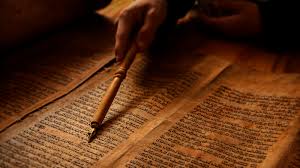This is the Torah
4: 44-49
These verses serve a similar purpose to 1:4-5, namely, to summarize the historical events which preceded the general stipulations that follow.

The Jewish principle in worship and in the Synagogue is that “the product is more important than the salesman.” Interpreting this to plain language: The Bible is the Word of God, and that is our product. The rabbi (pastor) is the salesman. The most important part of the service is reading the Word of God. Let me say it in a different way. Hearing from God is the most important thing – hearing from God is the reading of His Word! The rabbi (pastor) only dishes it out with the mashed potatoes and the green beans as side dishes.138
This is the Torah, which Moses set before Bnei-Yisrael. These are the testimonies and the statutes and the ordinances, which Moses spoke to Bnei-Yisrael when they came out from Egypt – beyond the Jordan, in the valley opposite Beth-peor, in the land of Sihon king of the Amorites who lived at Heshbon, whom Moses and Bnei-Yisrael struck down when they came out from Egypt (4:44-46). These scriptures are recited every Shabbat around the world. What Moses set before Isra’el as they were camped on the plain of Mo’av was not a new covenant, but instead represents the renewing of the old covenant, given to their parents forty years previously at the same location. The Torah, to which Moshe refers to, covers Chapters 5-26. More broadly, it refers to all the stipulations of the covenant (to see link click Bi – The Stipulations of the Covenant) Moses had delivered to Isra’el since they were encamped at Mount Sinai.
Moshe reminds his fellow Israelites of the immediate historical context, namely, their coming out from Egypt and their conquest of the land formerly occupied by the Amorites under Sihon (see Au – The Conquest of Sihon) and Og (see Av – The Conquest of Og). The intervention of ADONAI on their behalf in both events, gave YHVH the authority to demand their wholehearted obedience and loyalty to His covenant.
They took possession of his land and the land of Og king of the Bashan, the two kings of the Amorites who were beyond the Jordan toward the east – from Aroer, which is on the edge of the wadi Arnon, as far as Mount Sion (that is, Hermon), and all the Arabah beyond the Jordan eastward, as far as the sea of the Arabah (or the Dead Sea) under the slopes of Pisgah (4:47-49). Moses reviews the land Isra’el occupied at that time: all the Transjordan (except the land controlled by nations with a blood-relationship with Isra’el – the Edomites, Moabites, and Ammonites), all given to them by YHVH.139



Leave A Comment